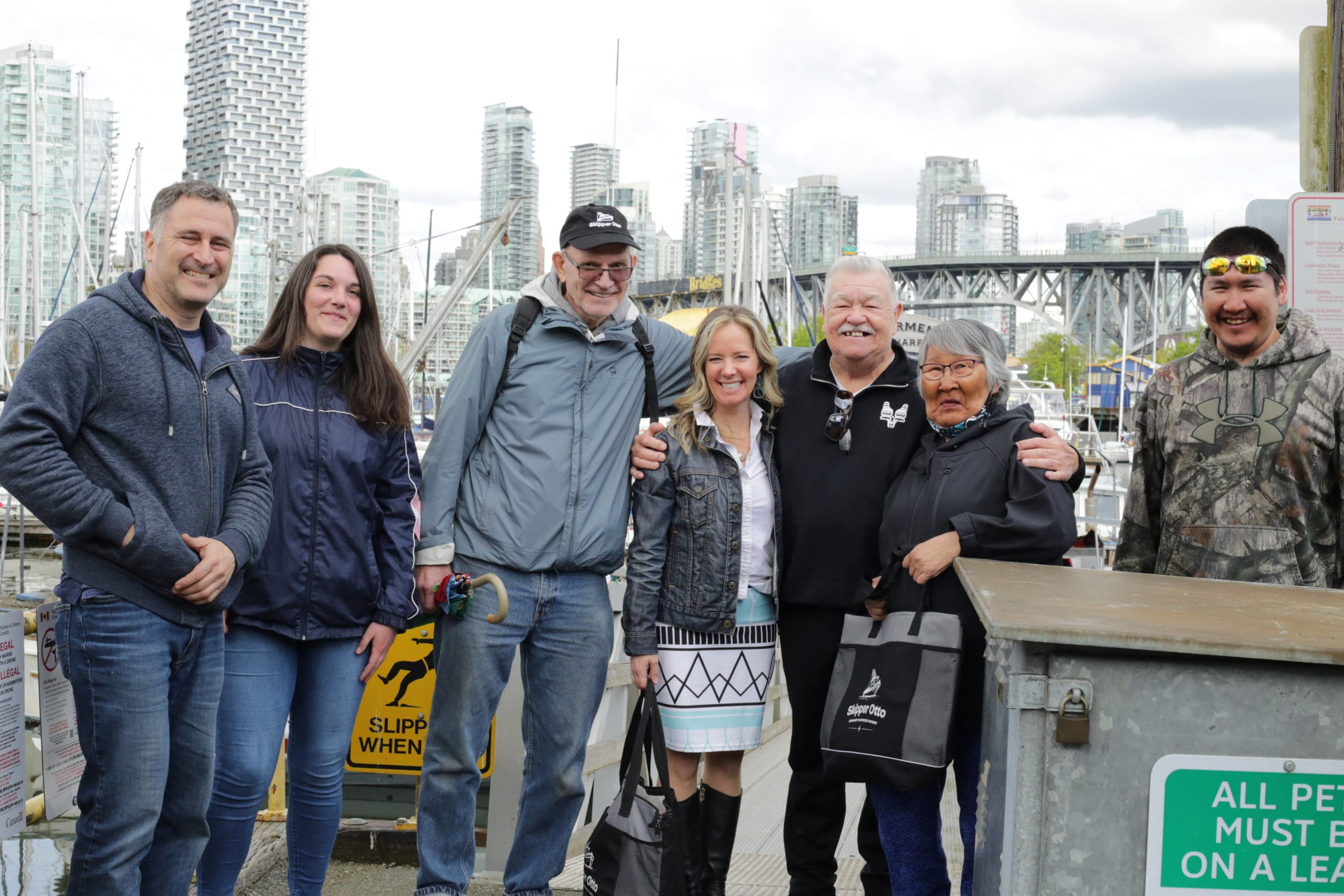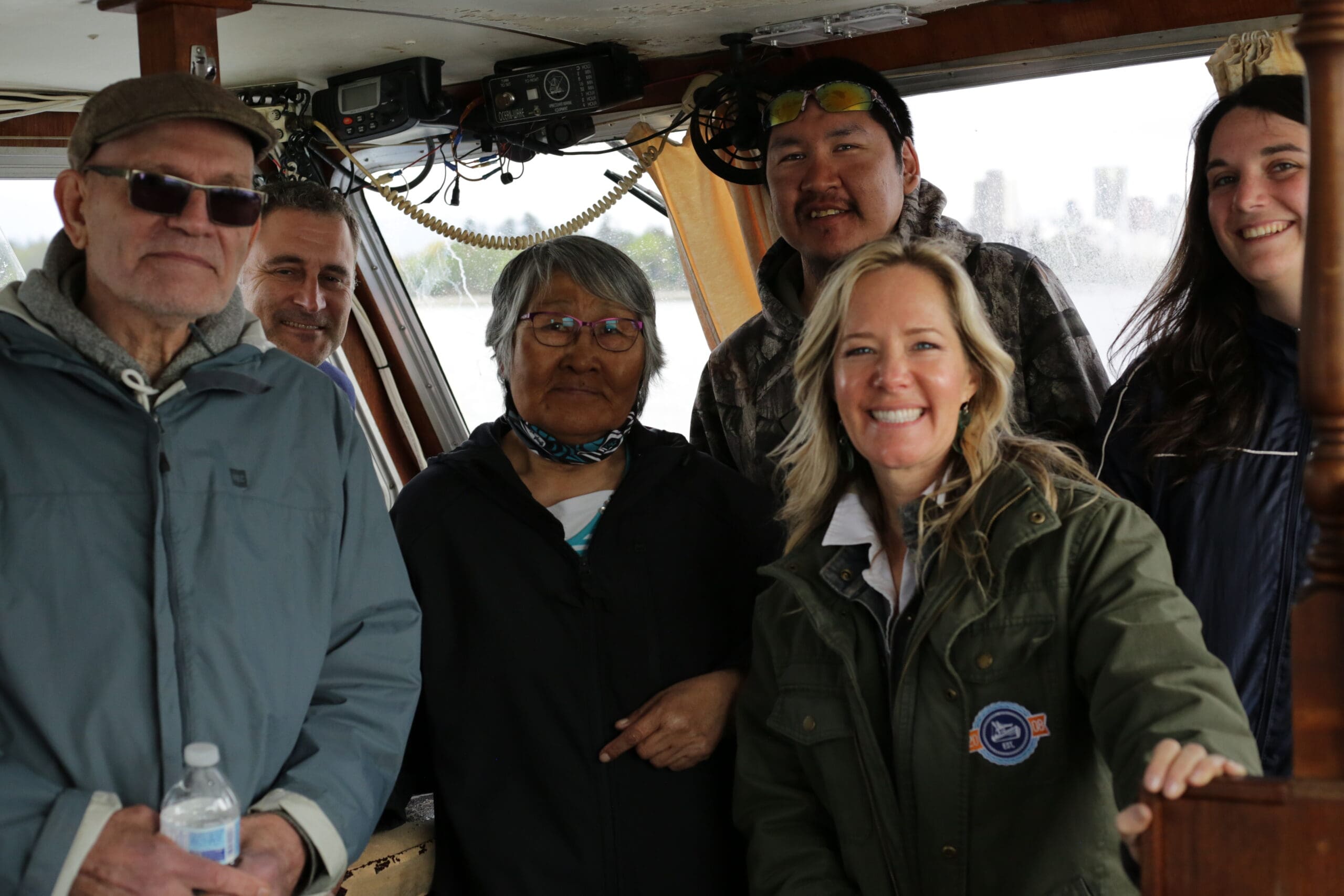A Day At The Wharf
NewsIn this post, Sonia reflects on our theory of change in action. She reiterates that together, through active listening and creating opportunities for voices to be heard, we can build a more just and equitable seafood system.

I truly believe that when you create space for a diversity of voices to be heard, that’s when really beautiful collaboration and co-creation happen. This is our theory of change in action: it is through active listening and creating opportunities for voices to be heard that, together, we build a just and equitable seafood system. The real work of reconciliation and decolonization often just looks like listening and relationship building. But these interactions are the fertile ground for solutions. Earlier this spring, years of active listening and relationship building came together in one perfect and beautiful illustration of this theory in action and I wanted to share it with you!
I first met ‘Namgis elder Chris Cook in 2018 at the Fisheries for Communities gathering. I was struck by his impassioned speeches about the decay of his fishing community in Alert Bay. What had once been the thriving fishing hub of a proud seafaring nation was now a ghost town of dilapidated boats and a community of young people in crisis, losing their connections to their traditional way of life. I knew immediately that Chris would be an important teacher for me, and I would need his voice to help guide the direction of Skipper Otto. For years, Chris and I enjoyed regular phone chats where he would tell me stories of growing up fishing in Alert Bay, and the values, world view, and beliefs that underpin his community. In 2021, during one of those calls, I mentioned that we were hiring for our distribution team and wondered if he knew any ‘Namgis community members living in Vancouver looking for work. Chris suggested he introduce me to his daughter Emily so we could explore the possibility of having her work at Skipper Otto.
Now, if you’ve had the pleasure of meeting Emily at one of our Fishermen’s Wharf pick-ups, you’ll know that she is one of the most kind and generous people you’ll ever meet. And during my first 2-hour phone call with Emily, I knew right away she would fit in with our team, our culture, and our vision. After just a few shifts, it was clear Emily was a great fit for our team. In February 2022, Emily moved from part-time to our full-time team and we feel so lucky to have her!
Meanwhile, another narrative was unfolding which would converge with Chris and Emily’s on this sunny spring day at Fishermen’s Wharf in 2022! Over the past 2 years we’ve been slowly growing a relationship with the Inuit community of Taloyoak in Nunavut. The Hunters and Trappers Organization (HTO) received the Northern Innovation Prize in 2020 to help them build a resilient, community-based food system to help them equitably distribute their traditionally hunted meats and fish to their community members. They reached out to us in 2021 to learn more about the Skipper Otto model and how they might be able to use some of our systems, tools, and software to help build their program. I learned of the poverty, food insecurity, and health crises endemic in their community and their dream of how to alleviate some of these crises. After many months of phone calls and cancelled travel due to storms and floods, Peter Aqqaq and Kublu Tucktoo flew from Taloyoak to meet us in person at Fishermen’s Wharf! It was a beautiful sunny afternoon and Shaun and I took our guests out on Eldorado, our salmon gillnetter, for a little tour of the harbour.

Peter had lots of questions about how salmon gillnetting worked and he and Shaun compared ice fish gillnetting to pacific salmon gillnetting. “I never thought I’d see the Pacific ocean in my life,” he said with a huge smile, unable to take his eyes off the horizon. He showed us videos of narwhal hunting and photos from a recent polar bear kill. “That one gave an 8-foot pelt. It’ll make a nice pair of pants,” he explained. Kublu is an elder and a language teacher and she patiently taught me how to pronounce long, multi-syllabic Inuktitut words, slowly repeating them, patiently spelling them out in phonetics, interspersed with her contagious and jolly laugh. She told us how she’d come to Vancouver once before – to work at the Nunuvut pavilion at Expo 86. “I don’t think any of those buildings were here then,” she laughed, gesturing toward the towers lining False Creek.
Now here’s where the two stories converge: toward the end of our boat tour, I got a text from Emily asking if we were nearby. Her dad was visiting and would love to see us! I hadn’t seen Chris in person since before the pandemic and I was thrilled he was in town. A big bear hug from Chris Cook is good medicine and I didn’t want to miss him! Shaun docked the boat at our slip and we walked up the ramp to the locker bay. Chris hugged me and we laughed and talked. I introduced him to Peter and Kublu from Nunavut and the three of them hit it off right away. I stood nearby and listened eagerly as they exchanged stories of what it was like where they came from. They shared words in their languages and remarked on the similarities and differences. And then Kublu and Chris, the two elders, spoke about their school experiences, how they were given the strap or the ruler for speaking their own languages, how they protected themselves, and how their spirits survived in the face of such harsh experiences. I stood in awe silently nearby as I listened to these two Indigenous elders from such different communities so far away from one another connect and share their personal stories.
After a time, Chris told me he had a gift for us. We walked together to the packing area in the back of the locker and there, atop one of the freezers, lay this enormous, beautiful cedar carving of a salmon. His nephew had carved it and he wanted to give it to us to thank us for everything. For protecting a fishing way of life, for sharing stories of Indigenous fishermen, and for welcoming his daughter into our community. I was speechless! I hugged Chris and choked back tears of gratitude.

As we were getting ready to leave the wharf that afternoon, Mike Joyce, our Distribution Manager came up to me and said “Hey. You should be really proud of all this.” He gestured to where Kublu and Chris were talking and laughing, to where Peter was talking with one of our fishermen and looking at gear, and to where our staff were busy putting together member orders. I was surprised at first. What did all of this amazing stuff going on have to do with me? But Mike reminded me that building a culture of trust and positive expectations was what I should feel good about. And he was right. I am proud of my role in building that culture at Skipper Otto. But I am even more proud of how it is so much bigger than me too. This bright and busy afternoon at Fishermen’s Wharf is an example of the beautiful relationships and meaningful connections that are the result of years of active listening and making space for creative solutions from so many different voices and perspectives. I am thrilled to be a part of this diverse community that is working hard to tackle our most pressing social and environmental crises.
